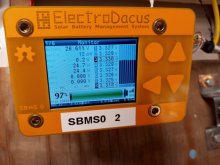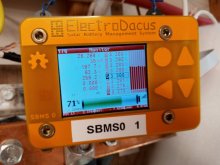Hello, I'm converting a short bus and am planning on building my own battery bank out of prismatic cells. I'm new to this, and I believe I have thoroughly done my research... But I still have a few uncertainties and wanted to get some advice/verification before I start ordering things, as I'm not 100% sure if I'm spot on.
My plan is:
I already have two 230w panels.
Looking to purchase 8 176Ah 3.2v cells from Xuba on alibaba (only $583 shipped!)
I then want to wire them into one 352Ah 12v battery, so I only have to use one BMS and one case, etc.
I'm terrible with vocabulary, but I'd put two cells together to make one, then treat it as if I have 4 and wire as normal (2 parallel 4 series??)
As for the BMS I was originally looking at the Chargery BMS8T-300A 4.0, but I'm not set on this.
I will have a 1500-2000w inverter, and won't have any appliances that draw more than 1000w.
Haven't decided on a charge controller yet, but I'm guessing I should get a 35-40 amp one. Are the Victrons worth the price tag? Renogy?
This seems like the cheapest way to get 350ah, but I haven't seen anyone else do 2p4s with 176Ah cells so I'm hesitant for no good reason (or for good reason)
The thing I'm least sure about is the BMS.
If my battery capacity is above 300ah, is the 300a bms too small? If I understand correctly, the bms is less relevant to how much capacity the batteries have, and more to do with how much draw is needed at once?
And since I'm just having a 1500-2000w inverter that won't often go above 1000w, is that overkill? I believe a 1500w pull through the inverter would equate to about a 150a pull from the batteries. Is that correct? And therefore the 300a bms would more than handle that? Could I get away with a smaller one or is that ill-advised?
I've also heard some mixed reviews about the Chargery and it being very hard to program/set up and finicky to work with. Is there a better (still affordable) BMS that would work for my application?
I just came across this: Heltec BMS with a 330a option and it seems like it could work?
Looks like Daly also makes a high amp bms
Also, is the one battery method a smart move? Something about putting everything in one battery and if it fails I have zero power seems a bit risky.. but also I'd love to save the money on building two separate 176Ah batteries. So leaning towards the one large battery.
Am I missing anything important? I think the bms comes with temp sensor so that's covered. I've heard of some people putting a fuse somewhere in their battery, but haven't been able to find too much info on it. I know fuses go elsewhere in the electrical system. Is the battery one necessary/advised, and if so, where does it go?
Thanks for reading! Any advice is greatly appreciated!
My plan is:
I already have two 230w panels.
Looking to purchase 8 176Ah 3.2v cells from Xuba on alibaba (only $583 shipped!)
I then want to wire them into one 352Ah 12v battery, so I only have to use one BMS and one case, etc.
I'm terrible with vocabulary, but I'd put two cells together to make one, then treat it as if I have 4 and wire as normal (2 parallel 4 series??)
As for the BMS I was originally looking at the Chargery BMS8T-300A 4.0, but I'm not set on this.
I will have a 1500-2000w inverter, and won't have any appliances that draw more than 1000w.
Haven't decided on a charge controller yet, but I'm guessing I should get a 35-40 amp one. Are the Victrons worth the price tag? Renogy?
This seems like the cheapest way to get 350ah, but I haven't seen anyone else do 2p4s with 176Ah cells so I'm hesitant for no good reason (or for good reason)
The thing I'm least sure about is the BMS.
If my battery capacity is above 300ah, is the 300a bms too small? If I understand correctly, the bms is less relevant to how much capacity the batteries have, and more to do with how much draw is needed at once?
And since I'm just having a 1500-2000w inverter that won't often go above 1000w, is that overkill? I believe a 1500w pull through the inverter would equate to about a 150a pull from the batteries. Is that correct? And therefore the 300a bms would more than handle that? Could I get away with a smaller one or is that ill-advised?
I've also heard some mixed reviews about the Chargery and it being very hard to program/set up and finicky to work with. Is there a better (still affordable) BMS that would work for my application?
I just came across this: Heltec BMS with a 330a option and it seems like it could work?
Looks like Daly also makes a high amp bms
Also, is the one battery method a smart move? Something about putting everything in one battery and if it fails I have zero power seems a bit risky.. but also I'd love to save the money on building two separate 176Ah batteries. So leaning towards the one large battery.
Am I missing anything important? I think the bms comes with temp sensor so that's covered. I've heard of some people putting a fuse somewhere in their battery, but haven't been able to find too much info on it. I know fuses go elsewhere in the electrical system. Is the battery one necessary/advised, and if so, where does it go?
Thanks for reading! Any advice is greatly appreciated!




